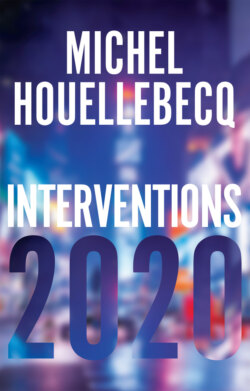Читать книгу Interventions 2020 - Мишель Уэльбек - Страница 6
2 The Mirage by Jean-Claude Guiguet
ОглавлениеAcultivated middle-class family on the shores of Lake Geneva. Classical music, short sequences with a great deal of dialogue, cutaways to the lake; all of this might give one the impression of déjà vu. The fact that the girl is painting intensifies our worries. But no, this isn’t the twentyfifth Eric Rohmer clone. It’s, oddly, much more than that.
When a film constantly juxtaposes the maddening and the magical, the magical rarely wins out; yet that’s what happens here. The actors, somewhat hit-and-miss in their approach, have a hard time interpreting a script that seems overwritten and sometimes borders on the ridiculous. People will say they haven’t found the right tone; this may not be entirely their fault. What’s the right tone for a sentence such as ‘The fine weather has come to join us’? Only the mother, Louise Marleau, is perfect from start to finish, and it’s undoubtedly her magnificent love monologue (it’s an amazing thing in films, the love monologue) that elicits our unreserved approval. We can soon forgive some of the dubious dialogues, some of the rather heavy-handed musical punctuations; in any case, none of this would get noticed in an ordinary film.
Starting with a theme of tragic simplicity (it’s spring and the weather is fine; a woman of about fifty aspires to experience one last carnal passion; but if nature is beautiful, it’s also cruel), Jean-Claude Guiguet has taken the maximum risk: that of formal perfection. The film is as far removed from the TV advert effect as it is from sputtering realism and arbitrary experimentalism; here, the sole pursuit is that of pure beauty. The way it’s cut into sequences, classic, refined, tenderly daring, corresponds exactly to the impeccable geometry of the framing. It’s all precise, sober, and structured like the facets of a diamond: a rare work. It’s also rare to see a film where the light so intelligently suits the emotional tone of the scenes. The lighting and decoration of the interior scenes are profoundly right, infinitely tactful; they remain in the background, like a discreet and dense orchestral accompaniment. It’s only in the outdoor scenes, in the sunny meadows bordering the lake, that the light bursts out, playing a central role; and this too is perfectly in line with the film’s purpose. There is a terrible carnal luminosity to the faces. Nature wears a shimmering mask, which, as we know, conceals a sordid swarming, but this mask can’t be torn away (never, by the way, has the spirit of Thomas Mann been so profoundly captured). We can’t expect anything good to come from the sun; but human beings can perhaps, to some extent, manage to love each other. I don’t remember hearing a mother say ‘I love you’ to her daughter so convincingly; not in any film, ever.
With violence, with nostalgia, almost with pain, Le Mirage sets out to be a cultivated film, a European film; and oddly enough it succeeds, combining an authentically Germanic depth and sense of fracture with a profoundly French luminosity and classic clarity of exposition. Truly a rare film.
